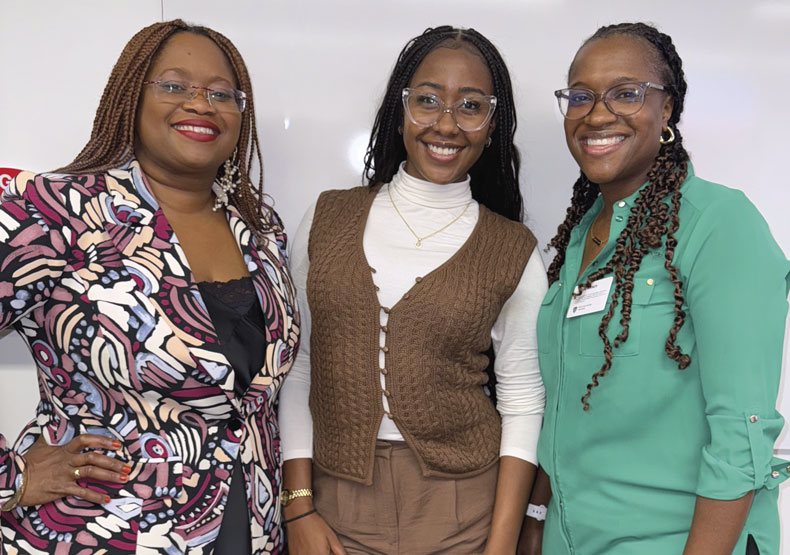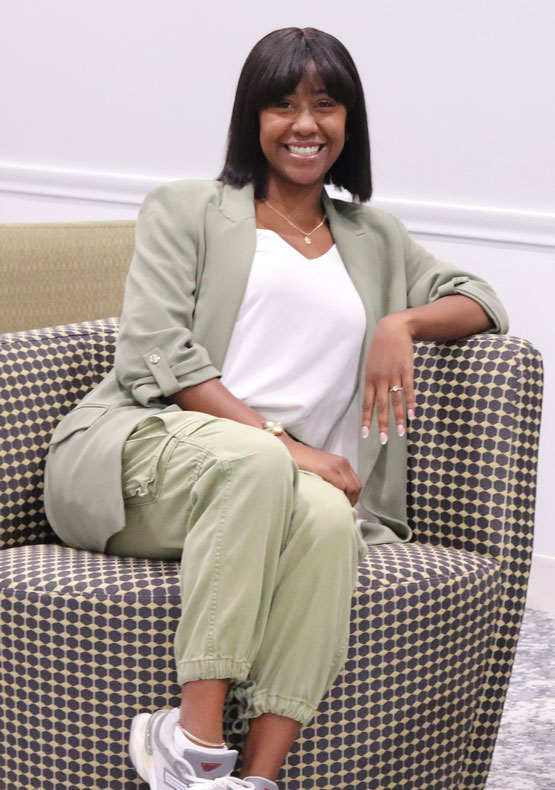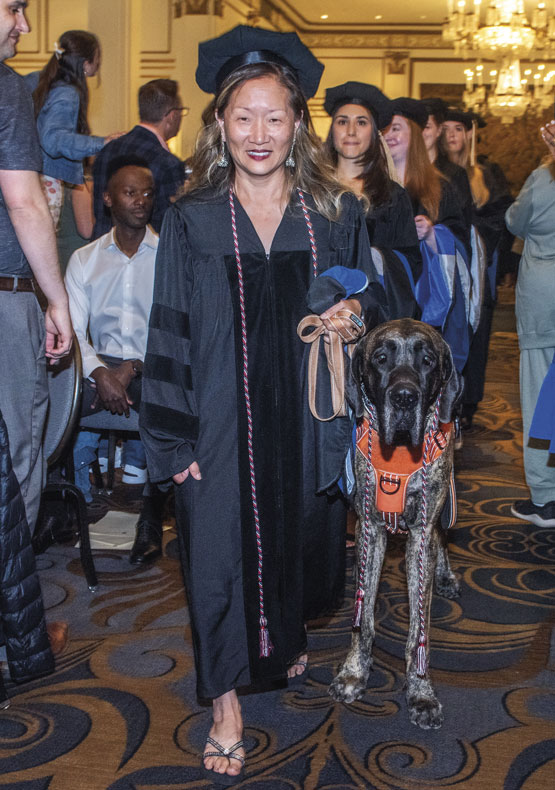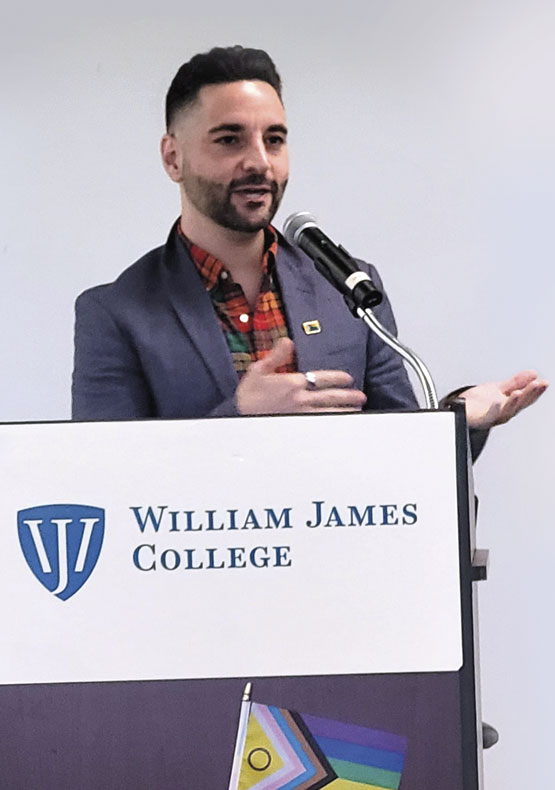Why Representation Matters in Mental Health: Students and Alumni Reflect on The Impact of Their Mentors

(L to R) Dr. Natalie A. Cort, Associate Professor, Director, Center for Multicultural and Global Mental Health, Alyssa Cetoute, and Dr. Shani Turner, Assistant Professor, Director, African and Caribbean Mental Health Concentration
For communities keen on inclusion, representation of diverse perspectives is key. It’s been shown to build confidence and increase belonging among individuals from historically marginalized groups which, when it comes to mental health, might make representation matter even more than in other arenas. A dearth of behavioral health providers—coupled with fewer ethnic, racial, sexual, and linguistic minority providers among the existing workforce—only compounds the problem, leaving individuals from diverse backgrounds at a greater deficit than their peers. Representation provides diverse groups a seat at the table and ensures their voices and perspectives are heard. Read on for a trio of William James College students who, after seeing themselves reflected in the faculty and staff on campus, continue to pay it forward by meeting the needs of diverse clients, including those who identify as BIPOC, Veteran, and LGBTQIA+.
 Alyssa Cetoute was a graduate student at Johns Hopkins University when she encountered her first
professor of color, Dr. Norma Day-Vines. Several years later, when the first-generation
Haitian-American enrolled at William James College to pursue her PsyD in Clinical
Psychology, she was met with a welcome surprise:
Alyssa Cetoute was a graduate student at Johns Hopkins University when she encountered her first
professor of color, Dr. Norma Day-Vines. Several years later, when the first-generation
Haitian-American enrolled at William James College to pursue her PsyD in Clinical
Psychology, she was met with a welcome surprise:
“In my very first class, taught by Dr. Shani Turner, all my classmates were Black,” recalls Cetoute of the overwhelmingly emotional experience.
The course, Intro to African and Caribbean Mental Health, had been a big draw for Cetoute—one that rivaled the College’s robust roster of educators who looked like her.
“Having a strong Caribbean presence in this professional setting, as evidenced by women doing what I want to do, has been incredibly inspiring,” says Cetoute in a nod to Dr. Gemima St. Louis and Dr. Natalie A. Cort, who hail from Haiti and Guyana respectively. While this cadre of mental health professionals has supported Cetoute’s journey in various ways, she cites a special bond with one in particular.
“Dr. Turner has been a supportive champion of me and my work [and] has always had my back,” says Cetoute of her advisor and second chair. “She has not only been encouraging, but also validating of my experience, understanding firsthand the barriers that exist, particularly for women of color,” says Cetoute of a cheering squad that’s been powerful, comforting, and instrumental to individuals like her (Cetoute is a licensed mental health clinician with a private practice) providing culturally competent care to the underserved communities and BIPOC populations with which they identify—presenting a win-win for all.

Sara Garde spent 19 years in the military (including two years total deployment) before contemplating graduate school. The mental health care provided by the United States Department of Veteran Affairs (VA) was not aligning with her needs, so she sought an avenue that might—enrolling in the PsyD program at William James College where the Military and Veterans Psychology (MVP) community piqued her interest.
“I thought if I could get the tools and knowledge to help myself, I could pass the healing on to other Veterans,” says Garde, who credits the military-friendly campus and MVP concentration as major selling points.
“Dr. Jenny D’Olympia was pivotal in helping me to find a path forward and complete the program by offering her unique perspective,” says Garde, citing her mentor’s deep listening, unwavering support, and shared experience in uniform as instrumental to her success as a student—in particular, one with three decades of lived experience since enlisting.
“Collaborating with other female Veterans, especially those who have licensure in behavioral health, made earning my degree a joyful experience,” says Garde who underscores that women make up just 10% of total Veterans. At present, there are roughly two dozen female Veterans enrolled at William James College, each poised to make an impact on meeting the mental health needs of Veterans.
“We don't often get to share our stories and points of view, our challenges and triumphs, with others who actually understand,” says Garde, who one day hopes to open a small private practice boasting off-hour—and perhaps some pro-bono—services to Veterans who find themselves in a bad way.
 Karam Hanna, LMFT, saw himself reflected at William James College from the moment he interviewed—three
weeks before classes commenced—with Dr. Nilda Laboy. “She was very forthcoming about her identity right away which, given the professional
setting, allowed me to be myself,” says Hanna who went on to earn his Master of Arts in Clinical Mental Health Counseling in 2018 with a cohort of openly LGBTQIA+ folks rallying around him, including Dr.
Jessica Stahl and Meridith Apflebaum.
Karam Hanna, LMFT, saw himself reflected at William James College from the moment he interviewed—three
weeks before classes commenced—with Dr. Nilda Laboy. “She was very forthcoming about her identity right away which, given the professional
setting, allowed me to be myself,” says Hanna who went on to earn his Master of Arts in Clinical Mental Health Counseling in 2018 with a cohort of openly LGBTQIA+ folks rallying around him, including Dr.
Jessica Stahl and Meridith Apflebaum.
“Each of these people was courageous in presenting their full identity, and not holding back, which gave me a sense of safety and security to be myself,” says Hanna who identifies as part of the LGBTQIA+ community.
Of all the tools acquired in his study, he holds fast to one lesson in particular: “At William James College, I was taught that my uniqueness, authenticity, and transparency as a therapist are what people would be drawn to the most,” says Hanna who nailed an essential skill long before graduation.
“Showing up as myself eliminated the struggle [of authenticity] and allowed me to focus on what’s really important—which is the clinical work,” says Hanna in a nod to mentors who modeled the way. These days, he’s paying it forward.
Years ago, Hanna was tapped to lead a group session for teenage boys in a colleague’s stead. “I stepped in, didn’t hide, and showed up as my transparent and authentic self,” he says. Eighteen months later, when one of those teens was seeking a new clinician, he posed an odd question to Hanna’s agency:
“I want to work on being seen as authentically myself—and I remember one guy who subbed for our group, who showed up as himself, and didn’t care what others thought. How do I get assigned to him?”
Six years later, he and Hanna are still working together.
“Despite what others tell you—or the messages you might be receiving—being authentically yourself is actually a superpower.”
Topics/Tags
Follow William James College
Media Contact
- Katie O'Hare
- Senior Director of Marketing
- katie_ohare@williamjames.edu
- 617-564-9389
